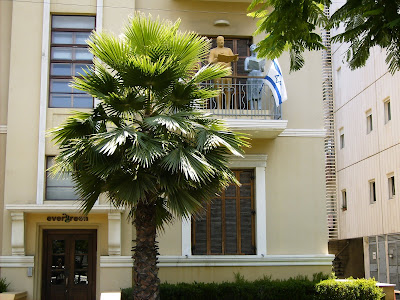We know little except her name, Tamar
Judah, fourth of Jacob's twelve sons, had "gone down" — a spiritual and physical decline after proposing to his brothers that they sell into slavery Jacob's showoff favored son, Joseph. Judah is now married to a Canaanite woman who bore him three sons: Er, Onan, and Shelah. When Er grows up, Judah finds him a wife, Tamar.
Tragedy strikes
Er "was evil in the eyes of the Lord" and dies. (The text does not describe the evil.) Judah instructs his second son, Onan, to marry Er's widow, Tamar, in a levirate marriage in which a widow's brother-in-law must marry her if the brother died childless. Onan, who "would waste his seed on the ground" rather than fulfill the obligation, is punished by death.
 Judah, fearing that his third son might die, too, if given in marriage to Tamar, sends her to "stay as a widow" with her father until Shelah is old enough to marry her. There, Tamar remains a "living widow" unable to marry while bound to her remaining brother-in-law.
Judah, fearing that his third son might die, too, if given in marriage to Tamar, sends her to "stay as a widow" with her father until Shelah is old enough to marry her. There, Tamar remains a "living widow" unable to marry while bound to her remaining brother-in-law.Taking destiny in her hands
When Tamar learns that Judah is approaching nearby Timnah for the sheep shearing, she veils her face, dresses as a prostitute, and stands on the road he will take. Judah approaches and sleeps with her, and she becomes pregnant and returns home. Three months later, her disguise long removed and condition apparent, people inform Judah. Indignant, he reasons that she is guilty of adultery because she is bound to Shelah. "Take her out to be burned," he orders.
 A significant detail
A significant detailIn Tamar's ruse, before performing services for Judah, she negotiated payment and insisted on a pledge — his seal, cord, and staff.
When he sends a messenger to pay Tamar and reclaim the pledge, she cannot be found in her masquerade costume. Appearing as herself, she returns the pledge items with the message, "By the man to whom these belong I have conceived." In this masterly stroke, Tamar has established her innocence without shaming Judah who alone understands the course of events. Her discretion inspired the Sages to claim that one willingly be thrown into a fiery furnace rather than shame someone in public.
What was Tamar up to?
According to the Midrash of Nahmanides and of Hizkuni, Tamar was following the levirate marriage custom in which absent the possibility of the deceased husband's brother marrying his widow the father-in-law or a close relative can take his place. Tamar's piety ensured that her husband Er's name and family line would continue.
 Ruth's story told in the Book of Ruth is similar to Tamar's. Both begin with a father-in-law's descent. In both stories, marriageable sons die: Judah's sons Er and Onan; Elimelech's Machlon and Chilyon. In both, a widowed woman is childless, and a woman's bold act triggers the denouement. Tamar poses as a prostitute, and Ruth lies at the feet (a euphemism!) of Boaz. In neither case are the men next in line in the levirate marriage (for Tamar, it was Shelah; for Ruth, the anonymous Peloni-Almoni, whose claim Boaz asks to forego).
Ruth's story told in the Book of Ruth is similar to Tamar's. Both begin with a father-in-law's descent. In both stories, marriageable sons die: Judah's sons Er and Onan; Elimelech's Machlon and Chilyon. In both, a widowed woman is childless, and a woman's bold act triggers the denouement. Tamar poses as a prostitute, and Ruth lies at the feet (a euphemism!) of Boaz. In neither case are the men next in line in the levirate marriage (for Tamar, it was Shelah; for Ruth, the anonymous Peloni-Almoni, whose claim Boaz asks to forego).Why mention Tamar and Judah in the Book of Ruth?
The Book of Ruth states explicitly the connection between the women. When the elders permit Boaz to buy Naomi's field and marry Ruth, they pronounce, "May the Lord make the woman who is coming into your home like Rachel and Leah who together built up the house of Israel . . . May your family be like Perez whom Tamar bore to Judah."

This Book ends with a genealogy that counts ten generations from Peretz to King David whose family tree begins with Peretz, born to Judah and Tamar, and, the seventh generation son Obed, born to Ruth and Boaz. Thus, the family tree of Israel's great and future King includes Tamar and Ruth whose virtue, loyalty, kindness, and discretion contributed to David's greatness.
Heroines at the extreme
margins of Israelite society
Ruth is a Moabite; we are not told Tamar's family origins. The Sages say she was descended from Shem; Philo ((20 BCE - 50 CE), that she was the child of idolaters. Yet, says Boaz of Ruth, both women bear children "to maintain the name of the dead . . . so that his [deceased husband's] name will not disappear." And both are sensitive to the living — Tamar by not shaming Judah, Ruth by not letting her mother-in-law, Naomi, return home alone.
The stories of both women, childless widows and outsiders move me deeply. Tamar and Ruth, powerless yet of moral courage, wrote their names into Jewish history as role models who gave birth to kings, reminding us that true royalty lies in love and faithfulness, and that greatness often exists where we expect it least.



































